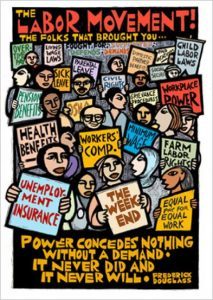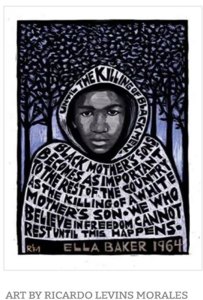Project Veritas founder James O’Keefe talks a big game about free speech. But he opposes the unions that protect workers from being fired for expressing their views.
James O’Keefe speaking with attendees at the 2020 Student Action Summit in West Palm Beach, Florida, 2020. (Gage Skidmore / Wikimedia Commons)
What Project Veritas Does
O’Keefe and his organization first rose to prominence in 2009, when he released deceptively edited videos intended to discredit the liberal nonprofit ACORN (Association of Community Organizations for Reform Now). O’Keefe had to pay out $100,000 to one of the ACORN employees in his video, which is why he and his supporters now prefer to emphasize all the other court cases they’ve won in the years since then.
Of course, you can question whether all their legal victories prove that Project Veritas has gotten any more honest since the ACORN debacle. An alternate interpretation is that it’s incredibly difficult to win defamation cases in the American system and Project Veritas gets a lot of money from rich donors. They can afford good lawyers to win such cases for them — and advise O’Keefe on how to stay (just) on the right side of the law.
The essential point I wanted to the debate, though, wasn’t about Veritas’s dishonesty. It was about their ideological goals.
Free Speech and Labor Unions
“Free speech protections,” O’Keefe enthuses in his new book American Muckraker, “have been an integral feature of the American tradition.” He gives the example of James Madison, Alexander Hamilton, and John Jay anonymously writing The Federalist Papers under the collective pseudonym “Publius.”
O’Keefe seems to think they did this to protect themselves against some sort of state repression. “At the time,” he writes, “advocating for a document as revolutionary as the US Constitution was dangerous.”
O’Keefe’s understanding of the relevant history is a little off. The Federalist Papers were written and published years after the American Revolution. In fact, the Constitutional Convention had already completed its work. The only remaining question was whether the new constitution would be ratified.
Putting aside O’Keefe’s bad history, though, he’s absolutely right that anyone who values the free and open exchange of political ideas should care about protecting people who say controversial things from being penalized for their speech. In a repressive dictatorship, dissidents might have to worry about going to prison or even being killed. But what about the contemporary United States?
The US is a profoundly inegalitarian society where the wealthy and powerful wield far more political power than the rest of us, but it’s enough of a democracy that people aren’t usually worried that they’ll be sent to prison for tweeting the wrong thing or getting their picture taken participating in a protest march. The consequence for controversial speech ordinary people often do have to worry about is getting fired from their jobs. Most Americans have “at-will” employment arrangements at nonunionized workplaces where the boss can fire them at any time with little recourse or due process.
In unionized workplaces, on the other hand — especially in states with relatively friendly labor laws — one of the main functions of unions on a day-to-day basis is to protect their members from unjust termination. If O’Keefe really cared about creating a society where workers felt more free to say things that anger their bosses without losing their livelihoods, he would be sending his hidden cameras into rooms where Starbucks or Amazon managers were discussing union-busting strategy.
Instead, he does the opposite. In the early years of Project Veritas, O’Keefe did a series of Teachers Union Gone Wild videos where he went after the New Jersey Educational Association (NJEA). (Full disclosure: I was a low-level elected official in a different New Jersey teachers’ union, the Part-Time Lecturers Union of the Rutgers AAUP-AFT, for two years.)
In our debate, the only part of “Teachers Union Gone Wild” videos he seemed to have any interest in discussing was a twenty-second snippet of the first one where someone relays a rumor over drinks at a NJEA convention about a teacher saying the N-word in front of students. If what the teacher says in the video is accurate — we’re talking, remember, about a rumor being relayed over drinks about a teacher who’s never named — it sounds like there was some sort of disciplinary process but the teacher didn’t completely lose their job.
In the ambush interview before the debate, O’Keefe absurdly accused me of “doctoring” the video in a segment we did on my show Give Them An Argument responding to O’Keefe’s crusade against the teachers’ union. What he meant was that in the (unedited) fifty-four-second clip we played we didn’t include the twenty seconds about the N-word rumor. That’s true. We also didn’t include the other four minutes of the video in that short clip. That doesn’t rise to the level of “doctoring.”
But the more important point lurking behind all this he-said/she-said is that even when workers do genuinely bad things where some level of punishment is appropriate (like saying the N-word in front of students), it’s a good thing that union representation can protect their interests during the disciplinary process — just like how when people are accused of doing bad things in the criminal justice system, it’s good that they have a lawyer to represent their interests instead of just being sent to Guantanamo Bay without a trial.
Outside of the twenty seconds on the N-word rumor, the video is primarily comprised of two things. The first is anything that can possibly be spun as instances of individual teachers acting badly at the union convention, ranging from casual drug use (of the kind that happens at any convention of a large organization) to swearing. Another is O’Keefe’s “exposé” of New Jersey teachers talking about how much they hated union-busting then-governor Chris Christie.
Does O’Keefe believe that teachers should be free to speak their mind in this way? It sure doesn’t seem like it.
In the “results” section at the bottom of the page on their website, Project Veritas brags about weakening tenure protections for New Jersey teachers. And if you’re a partisan hack devoted to making wealthy right-wing donors happy, I can see why you might consider that to be an important victory. But it makes a mockery of the idea that James O’Keefe gives a damn about free speech.
Editor's picks
- Casinos Not On Gamstop
- Casino Sites Not On Gamstop
- Non Gamstop Casinos
- UK Online Casinos Not On Gamstop
- Migliori Siti Di Casino Online
- Best Casinos Not On Gamstop
- I Migliori Casino Non Aams
- Migliori Casino Non Aams
- Betting Apps UK
- UK Casino Not On Gamstop
- Non Gamstop Casinos
- Sites Not On Gamstop
- Casino Sites Not On Gamstop
- Non Gamstop Casino
- Non Gamstop Casino Sites UK
- Gambling Sites Not On Gamstop
- Casino En Ligne France
- Online Casinos
- Online Casinos Nederland
- Non Gamstop Casinos
- Casinos Not On Gamstop
- Betting Site
- Best Non Gamstop Casinos
- Non Aams Casino
- UK Casino Not On Gamstop
- Non Gamstop Casino UK
- Meilleur Casino En Ligne En Belgique
- Meilleur Casino En Ligne Belgique
- Migliori Siti Casino Non Aams
- Meilleur Site De Pari En Ligne
- Meilleur Casino En Ligne Français
- 익명 카지노
- Meilleur Casino En Ligne 2026
- Meilleur Casino En Ligne
- Casino Non Aams Prelievo Immediato
- Meilleur Casino En Ligne France
- Meilleure Casino En Ligne
- 꽁머니 토토



